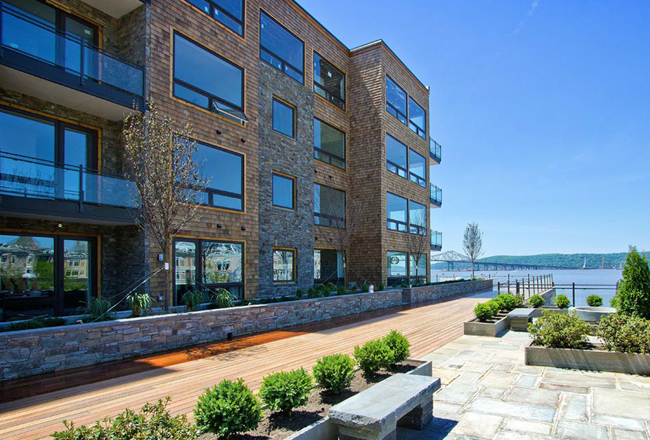National Resources principals accused of building defective Sleepy Hollow condominium
For the third time in four years, a homeowners”™ association has sued officials of Greenwich-based National Resources for allegedly building a defective condominium.

The board of managers of The River House at Sleepy Hollow Condominium is demanding $7 million from Joseph Cotter and Lynne Ward, in a lawsuit filed Aug. 12 in Westchester Supreme Court.
They “had knowledge of the defective and non-conforming conditions,” the complaint states, “concealed them and failed to correct them.”
Cotter did not immediately respond to a phone message requesting his side of the story.
In 2016, Cotter and Ward were sued for $1.2 million by the board of managers of Hudson Harbor I Condominium, Tarrytown, and in 2018 for $6.2 million by the board of managers of Lookout II Condominium, Tarrytown.
The allegations in those cases were strikingly similar to the claims in the new lawsuit. The previous cases were settled without public disclosure of terms.
National Resources, also known as National RE/sources, has created more than $1 billion in real estate projects nationally, according to its website. It specializes in redeveloping former corporate and industrial properties, such as iPark Hudson on a former Otis Elevator site in Yonkers and iPark 84 on a former IBM campus in East Fishkill.
River House, at 11 River St., Sleepy Hollow, was built on an industrial site on the Tarrytown border. The five-story condominium has 56 apartments, a restaurant and a parking garage.
Cotter and Ward, as the principals of the project sponsor, Rivers Edge Tarrytown LLC, were frequently at the construction site, according to the complaint, controlled River House”™s board of managers until June 2017, and should have known about design and construction defects.
The project was completed and the first apartments were sold in early 2016. Joanne Sold, River House”™s current board president, and her husband, Kenneth, bought their apartment in 2017 for $1,029,100.
Shortly after buyers took possession of their apartments, the complaint states, they began to complain to the sponsor “about problems with the condition of the building and surrounding property.”
Water leaked through the façade, roof and balconies, according to the complaint, wind and water penetrated windows and balcony doors, balcony railings were secured improperly. The offering plan called for the façade to be made of metal and stone, but instead it was built with wood and stone.
The sponsors allegedly took no meaningful actions to fix the alleged defects.
River House hired Kamen/Tall Architects to inspect the property. KTA purportedly found 42 substantial design and construction defects and determined that the building did not conform with the offering plan that buyers relied on when they bought apartments.
For instance, a glass panel had fallen from a balcony because of a failed fastener, KTA reported. Balconies drained poorly; water, snow and air seeped through windows and doors; the façade had loose and deteriorated masonry; compressors on the roof were not secured.
River House has already spent $225,000 to fix leaks that should have been repaired by the sponsor, according to the complaint, and it estimates that more repairs and remediation will cost $6.8 million.
The condominium board accuses the sponsor, Cotter and Ward of fraud, negligence, publishing false brochures and advertisements, and breaches of contract, fair dealing and fiduciary duty. Rivers Edge Tarrytown LLC is also named as a defendant.
River House is represented by Yonkers attorney Charles S. Welcome.